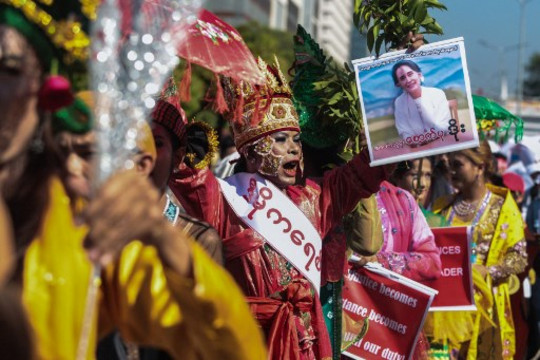Police in Myanmar reportedly used water cannons, rubber bullets, live ammunition and teargas to disperse protesters. Than Htike Aung, a reporter with local news website Mizzima, was hit with rubber bullets at a demonstration in Naypyidaw on February 9, but was able to return to work the next day. Over 27 anti-military protesters were arrested in Mandalay on February 9, including a journalist from Democratic Voice of Burma, who was detained after filming people beaten at a rally.
In a statement issued on February 7, the Myanmar Press Council protested the military’s imposition and restriction of press freedom. In particular the council condemned the blocking of frequencies used by the Democratic Voice of Burma and Mizzima News. Several journalists have also reported being tailed by security officers. Many journalists covering sensitive issues such as ethnic conflicts and military businesses have gone to ground during the current period of uncertainty.
The first widespread public protest against the military coup took place on February 2, as residents of Yangon banged pots and honked car horns to convey their dissent. Since then, public protests have intensified, with tens of thousands taking to the streets in both cities and rural areas..
On February 8, in direct violation of international law, military authorities enforced general restrictions on gatherings in 36 townships and implemented an 8pm – 4am curfew. Despite the restrictions people continued to demonstrate in largely peaceful protests in the days following.
A woman, identified as Mya Thwe Thwe Khine, was expected to die from a gunshot wound to the head, sustained during a protest in Naypyidaw. A video posted online, verified by Human Rights Watch, depicts a police vehicle firing a stream of water at Khine, who turns briefly before a loud crack is heard and slumps to the ground. Doctors confirmed the wound was consistent with that of live ammunition. Khine remains in a critical condition.
The commander in chief of Myanmar’s armed forces, Min Aung Hlaing, addressed the nation in his first televised address on February 8, repeating claims of election fraud and stating the military would hold elections and transfer power to the winner. The Ministry of Information also broadcast a statement on public television the same day, which denounced the ongoing protests. “Democracy can be destroyed if there is no discipline”, said the statement.
United States President Joe Biden announced the imposition of sanctions on Myanmar’s military leaders, which will prevent military leaders accessing funds totaling USD 1 billion, while maintaining support for health care, civil society groups and other programs to aid citizens of Myanmar. The United Nations Human Rights Council (UNHCR) will also hold a special session on February 12 to discuss the situation, which currently has the support of 45 states.
On February 11, the IFJ joined the International Trade Union Confederation (ITUC) in the Global Noise Barrage for Myanmar, encouraging worldwide participants to generate noise at 8pm Myanmar time, share hashtags #Workers4Myanmar and #SaveMyanmar and send letters to consulates and representatives from Myanmar to protest the military coup and its dire implications for press freedom.
The IFJ said: “The reports of violence and suppression of protests have dire implications for freedom of expression and the right to peaceful assembly. The IFJ stands in full solidarity with our journalist and media colleagues as well as all citizens of Myanmar protesting the military imposition of power and calling for an immediate return to democracy.”

